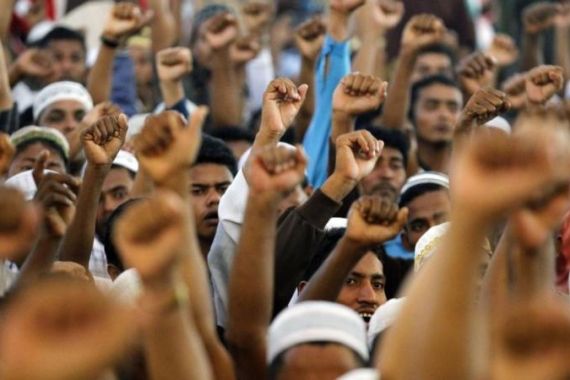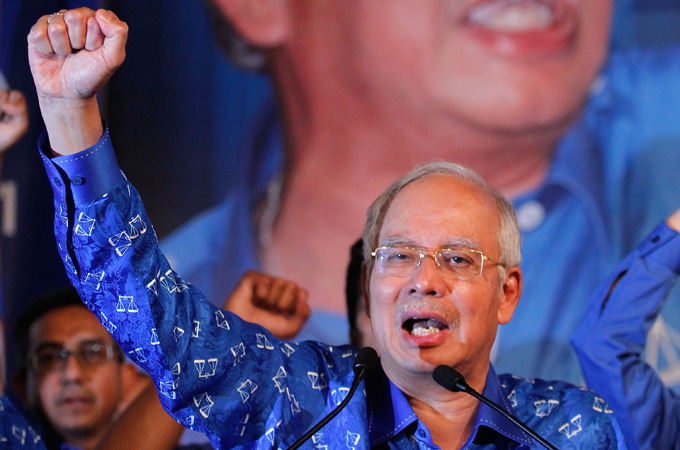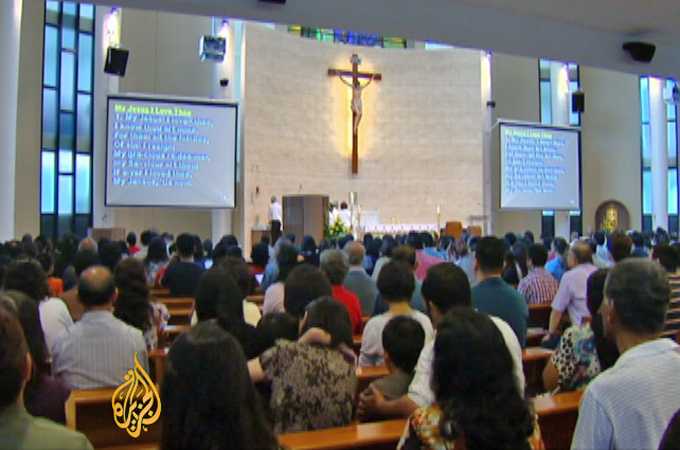Fight over ‘Allah’ back in Malaysia court
Government appeals Christians’ right to describe their god as ‘Allah’ as religious animosity grows.

Kuala Lumpur, Malaysia – Every Monday, Father Lawrence Andrew, the founding editor of Malaysia’s Catholic Herald, goes over his newspaper a final time before it’s despatched to the printers.
As well as checking for spelling and grammar, the weekly is published in the country’s four main languages – Malay, Chinese, Tamil and English – Father Lawrence also needs to be sure the word “Allah” is in quotation marks amid a long-running dispute over whether it is the “exclusive” domain of Malaysia’s Malay Muslims.
Christians in the Middle East and Indonesia have long used Allah to refer to the Christian God. So have Malaysia’s one million Christians, 60 percent who speak the Malay language and live mostly in the Borneo states of Sabah and Sarawak. But in 2008, the government threatened to revoke the Herald’s publishing licence if it continued to use the word, triggering a legal battle that has yet to be resolved.
“It’s almost like a life and death situation,” said Father Lawrence, at his office behind St. Antony’s Church in Kuala Lumpur, which this month marks its centenary. “[It means] we cannot quote from the Bible. If the word is Allah [they say] we have to change to Tuhan, so we are rendering the Bible inaccurate. They are attacking our creed.”
 |
| Malaysia’s Prime Minister Najib Razak [Getty Images] |
Although the High Court found in the Herald’s favour in 2009, affirming Christians’ constitutional right to use Allah, the government appealed the decision. On Tuesday, the Appeal Court finally began hearing the case, as scores of Christians and Muslims held vigils outside.
Playing to the Malay base
The court action comes in the wake of general elections in May that returned the ruling Barisan Nasional coalition – made up of three race-based parties – to power with less than half the popular vote. Prime Minister Najib Razak on election night blamed what he called a “Chinese tsunami” for the result, even as data showed it was mainly young, urban residents who backed the opposition.
But while Najib promised a process of national reconciliation, his Malay-based party, which now dominates the coalition, is facing leadership polls in a matter of weeks, and the recrimination has continued.
“There is an element of fear on the part of Barisan Nasional,” said Billy Ford from Freedom House in Washington DC, who has lived in Terengganu on Malaysia’s east coast. “They seem to have surrendered their efforts to attract non-Malays into the coalition, and instead have focused on playing to the Malay base.”
The court’s original decision triggered some of Malaysia’s worst religious violence in years, with some churches set on fire. The government then offered in 2011 what it called a 10-point solution, allowing the use of Allah for Bahasa Malaysia speaking Christians in Sabah and Sarawak.
But it’s now appealing the ruling on the grounds that Allah can only be used by Muslims and to allow Christians to do so would risk inflaming religious tensions. Official sermons posted online last week called for a “holy struggle” against the so-called enemies of Islam.
Rising tensions
Religious anxieties have been on the increase since last month, even though right-wing Malay candidates who ran on the ruling coalition’s ticket failed to win support at the polls.
Malaysians talk conflict, but they walk cohesion.
Last month, a Muslim Singaporean found his permanent residence permit revoked for allowing Buddhists to use a surau, or Muslim prayer space, for mediation. The surau itself was demolished.
Separately, a Muslim woman who videotaped herself walking her dogs past a mosque was questioned by police, after the years-old video suddenly resurfaced on the Internet.Dogs are seen as dirty animals by most Muslims.
In another incident, art work was confiscated from an exhibition marking Malaysia’s independence amid allegations it was an “insult to Islam”.
“The religious authorities are part of the status quo, part of the establishment machinery, and 50 percent of the population have shown that they don’t want the status quo anymore,” Universiti Malaya law lecturer Azmi Sharom told Al Jazeera. “There’s a concern on their part and that’s partly why there’s this crackdown. It seems petty, vindictive even.”
The role and powers of the religious authorities are likely to be back in the spotlight when the Islamic court hears charges on Thursday against a book shop employee relating to the sale of Irshad Manji’s book Allah, Liberty and Love .
For 15 months, Nik Raina Nik Abdul Aziz, 37, a store manager for one of the local branches of Borders bookshop, has lived with the threat of a two-year jail term. Her ordeal began when the Federal Territories Islamic Affairs Department, known by its Malay acronym of JAWI, raided the store where she worked looking for Manji’s book. At the time it was not banned.
Unable to prosecute the company, or the person responsible for choosing the books because he wasn’t Muslim, Nik Raina was charged.
In the meantime, Borders sought a judicial review in the conventional court – Malaysia has a dual legal system under a Federal Constitution – which in March ruled the raid and the charges against the young woman were unconstitutional and illegal.
Judge Zaleha Yusof chastised then-home minister Hishamuddin Hussein, saying he had “abdicated his duties” in suggesting religious raids should be possible, even if his ministry hadn’t banned the book. Last week, the same judge lifted the ban on the Malay-language version of Allah, Liberty and Love, after a case was brought by its local publishers.
Nik Raina’s lawyers have suggested to JAWI that it drop the case, but the religious authority has yet to do so, postponing court dates at the last minute on more than one occasion.
“If the book is not prejudicial as decided by the judge and the ban was wrong, that goes directly to the issue. What did Borders and Nik Raina do wrong?” Borders’ lawyer Rosli Dahlan said in an interview.
“They did not do wrong. The charge must be immediately withdrawn and JAWI should not be dragging its feet.”
A government spokesman said Malaysia was committed to promoting religious rights for all groups.
“Malaysia is a multi-ethnic and multi-religious society, which has been largely peaceful, harmonious and free from communal violence,” he told Al Jazeera. “The government is committed to maintaining this peace and stability, while also ensuring citizens’ rights are equally protected.”
Mixed messages
Despite the sensitivities highlighted by the recent string of incidents, analysts caution against portraying Malaysians as increasingly extremist.
 |
| Church-goers attend a sermon in Malaysia [Al Jazeera] |
“We have contradictions, but we have been able to live with this because of what I call the BN formula, not Barisan Nasional, but bargaining and negotiation,” said Professor AB Shamsul, the founding director of the Institute of Ethnic Studies at the Universiti Kebangsaan Malaysia.
Shamsul’s just completed a study of social relations in Malaysia. “Malaysians talk conflict, but they walk cohesion,” he said.
The spread of the Internet in Malaysia has provided a platform for many of those voices, but it has also given space to those with more extreme views. Some analysts worry the government, in an attempt to prove itself more Islamic than Malaysia’s Islamic party, has pandered too much to the fringes.
With the Appeal Court decision expected to take some time, some observers are urging authorities to tone down the rhetoric and respect the country’s legal processes.
“Don’t pressure our judges,” one of the country’s leading lawyers and a former law minister Zaid Ibrahim wrote on micro-blogging site Twitter last weekend.
“Of late, provocative and threatening statements [have been] issued by those in authority with regard to the ‘Allah issue’. The argument that a decision not approved by the people will lead to chaos is stupid and contemptuous. This is mob rule.”